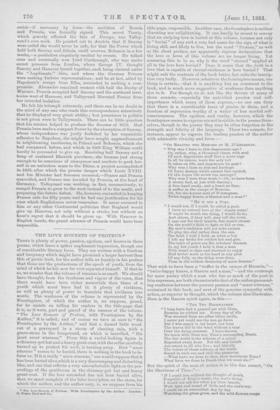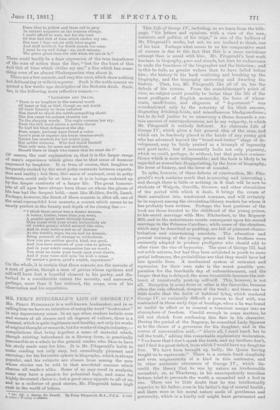THE LOVE SONNETS OF PROTEUS.*
THERE is plenty of power, passion, egotism, and licence in these poems, which leave a rather unpleasant impression, though one of .considerable literary force. They are written with a freedom and buoyancy which might have promised a larger harvest than this of poetic fruit, for the author tells us frankly in his preface that these are the productions of the epoch of youth, from the mind of which he hris now for ever separated himself. If that be so, we wonder that the volume of remains is so small. We should have thought, from the freshness and vigour of the verse, that there would have been richer memorials than these of a youth which must have had in it plenty of vividness, as well as plenty of power to translate that vividness into words. The weakness of the volume is represented by the Frontispiece, of which the author is, we suppose, proud, for he insists on telling his readers in the title-page that it is, as it were, part and parcel of the essence of the volume. "The Love Sonnets of Proteus, with Frontispiece by the Author," it is called ; and of course we turn at once to "the Frontispiece by the Author," and find a dismal little wood- cut of a graveyard in a storm of slanting rain, with a grave-stone in the foreground, on which is inscribed, " Hic je.eet amor mternus." From this a rueful-looking figure in a chimney-pot hat and a heavy great.coat,with the collar carefully turned up to protect his neck, is turning away. How " amor reternus " comes to be buried, there is nothing in the book to in- form us. If it is really " am or teternus," one would suppose that it has been buried alive,which is a very discouraging and disturbing idea, and one that reflects a very uncomfortable light on the pro- ceedings of the gentleman in the chimney-pot hat and heavy great-coat. If the love entombed has not been buried alive, then we must complain of the false inscription on the stone, for which the author, and the author only, is, we suppose from his • Tho Low, &Wittig of Protons. With Frontispiece by the Author. London C. Kogan Paul and Co. title-page, responsible. In either case, the frontispiece is neither charming nor enlightening. It can hardly be meant to convey that an undying love is buried in this volume, because not only is " burial " of any sort a very bad name for the sign of what is living still, and likely to live, but the word "Proteus," as well as the short preface, are apparently express declarations that the love or loves of this volume are no longer living. Yet assuming this to be so, why is the word " eternal " applied at all to the love here buried ? Does it mean that the faith, in a love that is capable of eternal existence is here buried ? That might suit the contents of the book better, but suits the inscrip- tion very badly. however; whatever the frontispiece means, one thing is certain,—that it is anything but an ornament to the book, and is much more suggestive of weakness than anything else in it. For though we do not like the flavour of many of these sonnets,—especially the unbridled passion and self- importance which many of them express,—no one can deny that there is a considerable trace of genius in them, and a freedom of expression worthy of a writer of less morbid self- consciousness. The egotism and vanity, however, which the frontispiece seems to express are not invisible in the poems them- selves, though in the poems they may be often forgotten in the strength and felicity of the language. These two sonnets, for instance, appear to express the leading passion of the author with admirable vivacity and force ON READING THE MEMOIRS OF M. D'AIITAGNAN.
" Why was I born in this degenerate age ?
Or, rather, why, a thousand times, with soul Of such degenerate stuff that a mute rage Is all its reason, tears the only toll
It takes on life, and impotence its goal ?
Why was I born to this sad heritage Of fierce desires which cannot fate control, Of idle hopes life never can assuage Why was I born thus weak?—Oh, to have been A merry fool, at jest with destiny ; A free hand ready, and a heart as free ; A niftier in the camps of Mazarin.
Oh, for the honest soul of D'Artagnan, Twice happy knave, a Gasoon and a man t" 441rE is NOT A row.
" I would not, if I could, be called a poet.
I have no natural love of the ' chaste muse.'
If aught be worth the doing, I would do it.; And others, if they will, may toll the news.
I care not for their laurels, but would choose On the world's field to fight or fall or run.
My soul's ambition will not take excuse To play the dial rather than the sun.
Tho faith I hold I hold, as when a boy I left my books for cricket-but and gun.
The tales of poets are Out scholars' themes.
In my hot youth I held it that a man With heart to dare and stomach to enjoy Had better work to his hand in any plan Of any folly, so the thing were done,
Than in the noblest dreaming of mere dreams."
That wish to have been a "ruflier in the camps of Mazarin,"— " twice-happy knave, a Gascon and a rnan,"—and the contempt for mere poetry which a man who has so much of the poet in him expresses, are both characteristic first of the rather gasconad- ing confusion between the poorest passion and "amor reternus," contained in this book, and next of the genuine sympathy with action, as superior to thought, which the volume also illustrates.
Here is the Gascon spirit again, in this
TIM Two IfICITIWAYMEN.
"I long have had a quarrel set with Time,
Because he robbed me. Every day-of life Was wrested from me after bitter strife, I never yet could see the sun go down But I was angry in my heart, nor hear The leaves full in the wind without a tear Over the dying summer. I have known No truce with Time nor, Time's accomplice, Death.
The fair world is the witness of a crime Repeated every hour. For life and breath Are sweet to all who live ; and bitterly The voices of these robbers of the heath Sound in each ear and chill the passer-by.
—What have we done to thee, thou monstrous Time ?
What have wo done to Death that we must die ?"
But the spirit of the man of action is in this fine sonnet, "On the Shortness of Time:"— "If I could live without the thought of death,
Forgetful of Time's waste, thy soul's decay, I would not ask for other joy than breath,
With light and sound of birds and the sun's ray.
I could sit on untroubled day by day Watching the grass grow, and the wild flowers range From blue to yellow and from rod to grey In natural sequence as the seasons change.
1 could afford to wait, but for the hurt
Of this dull tick of time which chides my ear.
But now I dare not sit with loins ungirt And staff unlifted, for death stands too near.
I must be up and doing—ay, each minute. The grave gives time for rest when we are in it."
There could hardly be a finer expression of the true impatience of the man of action than the line, " but for the hurt of this dull tick of time which chides my ear," a line which has some- thing even of an almost Shakespearian ring about it.
There are a few sonnets, and very fine ones, which show nothing but delineating or reflective power. Such is the noble sonnet we quoted a few weeks ago descriptive of the Bedouin Arab. Such, too, is the following more reflective sonnet :—
" LAUGHTER AND DEATH.
" There is no laughter in the natural world Of beast or fish or bird, though no sad doubt Of their futurity to them unfurled Has dared to check the mirth-compelling shout.
The lion roars his solemn thunder out To the sleeping woods. The eagle screams her cry. Even the lark must strain a serious throat To hurl his blest defiance at the sky.
Fear, anger, jealousy have found a voice. Love's pain or rapture the brute bosoms swell.
Nature has symbols for her nobler joys, Her nobler sorrows. Who had dared foretell That only man, by some sad mockery, Should learn to laugh who learns that he must die ?"
Of course, the real explanation is, that it is the larger range of man's experience which gives rise to that sense of humour expressed by laughter. It is true, of course, that laughter is frequently excited by the most petty contrasts between expecta- tion and reality ; but then, this sense of contrast, even in petty instances, could only be so keen as it is in beings wakened up by the deeper contrasts of a larger life. The great humour- ists of all ages have always been those on whom the gloom of life has had the deepest hold,—men like Molibre, Swift, Lamb. Perhaps, however, the finest of these sonnets is, after all, one of the semi-reproarchful love sonnets, a sonnet which seems to us nearly perfect in the beauty and depth of its closing line :-
" I think there never was a dearer woman, A better, kinder, truer than you were, A gentler spirit more divinely human Than yours with your sweet melancholy air Of tender gaiety, which seemed like cure, And in your voice a sob as of distress At the world's ways, its sin and its despair, Being yourself all strange to wickedness. Now you are neither gentle, kind, nor good, And you have sorrows of your own to grieve, And in your mirth compassion has no mood ; You wear no more your heart upon your sleeve, And if your voice still sobs 'tis with a sense Of sorrow's power, piers wealth, experience."
On the whole, it is certain that these sonnets are the sonnets of it man of genius, though a man of genius whose egotisms and self-will have lent a boastful element to his poetry, and dis- turbed to a considerable extent the serenity, and narrowed, perhaps, more than it has widened, the scope, even of his observation and his experience.





























 Previous page
Previous page